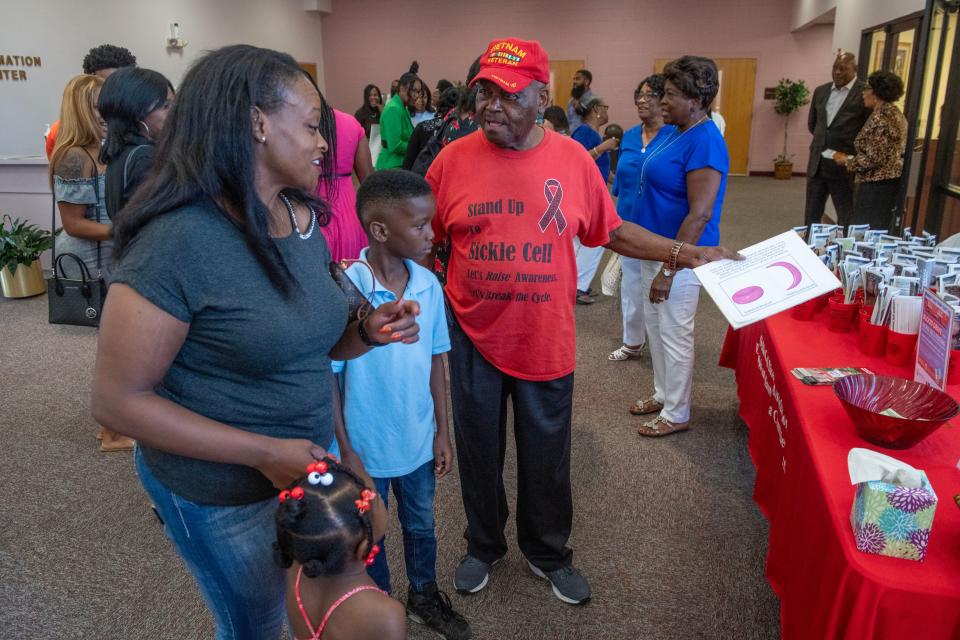If you're Black, your odds of getting sickle cell disease are significantly high
Local volunteers are on a mission to not only help residents learn if they have sickle cell disease, but to help out their neighbors who already suffer the devastating effects.
The Zion Hope Church, alongside the Sickle Cell Disease Association, Oneblood and Jack and Jill of America's Pensacola Chapter, hosted a blood drive and sickle cell testing event in late September during Sickle Cell Awareness Month, collecting 13 pints of blood and testing about a dozen people. Members of the organization are urging locals to donate and assist their neighbors suffering from bloodborne illnesses.
Sickle cell disease is the most commonly inherited blood disease among people. The disease causes soft red blood cells to transform from its regular disc-like shape into an abnormal shape, a hard crescent, which makes them more likely to get stuck together while traveling through blood cells.
Helping others: A mom suffered lifelong pain from sickle cell. Her daughter now works to educate others
These clumps of crescent red blood cells can make it difficult for blood to carry oxygen properly throughout the body, potentially causing severe pain, tissue damage, serious infection or even a stroke.
When the number of crescent blood cells begin to outnumber the amount of healthy red blood cells in the body, a sickle cell patient needs a blood transfusion to replace their sick cells. This dilemma requires frequent blood transfusions in order to keep the patient’s healthy blood cell count high. The American Red Cross estimates that people with sickle cell disease may need as much as 100 pints of blood every year.
The U.S. Centers for Disease Control and Prevention estimates that about 100,000 people in the U.S. have sickle cell disease. The disease mostly affects African Americans nationwide, but people of every ethnicity are susceptible to sickle cell disease.

Sickle cell disease occurs among about 1 out of every 365 Black or African-American births and occurs among about 1 out of every 16,300 Hispanic-American births. About 1 in 13 Black or African-American babies are born with sickle cell trait.
"There's no consistent PR about sickle cell on TV or in any other case, it's always on the backburner," said Walter Wallace Sr., a community activist afflicted by sickle cell and president/CEO of the Sickle Cell Disease Association of EscaRosa. "The disease doesn't just exist in September alone."
Who can donate blood?
Donors of every blood type may be a match for a patient with sickle cell disease, but donors with type-O blood have the most frequent matches. According to Oneblood, 1 in 2 African Americans with type-O blood are a match for sickle cell patients. Only 1 in 40 type-O blood donors of all other ethnicities are a match for sickle cell patients.
"I've had patients born with the disease, some that I've cared for and some that I've lost due to complications from the disease, which is why I've gotten more involved with (the Sickle Cell Association)," said Dr. Pamela Michelle Grier-Hall, a pediatrician at Community Health Northwest Florida. "It is very common for someone to not know they even have the trait, but it's important to know so you can at least be aware of it if you marry or have children with someone who has the trait."
Grier-Hall continued, "We have to reach out to other resources and areas ... we do encourage everyone to donate, especially those in the African American community because it's often a better match for the disease. We're thankful for Oneblood and Zion Hope on being able to partner for this event and we feel like it was a success."
This year's health threats in Florida: COVID takes a back seat: Here are the 2023 health threats getting all the buzz in Florida
What are the symptoms of sickle cell disease?
Each person can experience symptoms of sickle cell disease differently and symptoms can look like a case of a different blood disorder or medical issue. According to John Hopkins Medicine, the most common symptoms of sickle cell disease are:
Anemia
Jaundice, or yellowing of the skin, eyes and mouth.
Pain crisis, or sickle crisis
Acute chest syndrome
Splenic sequestration or pooling
Priapism
Stroke
What is the difference between sickle cell trait and the disease?
Sickle cell trait is when a person inherits one sickle hemoglobin gene and one normal hemoglobin gene from their parents. A person will be born with sickle cell disease only if two sickle hemoglobin genes are inherited; one from the mother and one from the father.
“That’s where people often get confused, mistaking the disease for the trait,” said Wallace Sr.
A person who inherits only one gene is healthy and said to be a carrier of the disease. A carrier has an increased chance of having a child with sickle cell disease if they have a child with another carrier. For parents who are each carriers of a sickle cell gene, there is a one in four chance of having a child with sickle cell disease according to John Hopkins Medicine.
Where can I donate blood?
You can donate blood at any blood donation center in the area, such as Oneblood or CSL Plasma, by setting up an appointment. People or organizations can also host their own blood drives after getting in contact and working with a blood donation center for the event.
This article originally appeared on Pensacola News Journal: Sickle Cell Disease awareness month over in Pensacola, care continues

